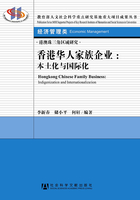
参考文献
[1] Adler, P. , Kwon, S. , 1999, “Social capital: The good, the bad, and the
ugly. Paper submitted to the OMT division of the Academy of Management, ”Reprinted in E. L. Lesser(Ed.), Knowledge and social capital,(Boston, MA:Butterworth-Heinemann).
[2] Coleman, J. S. ,1990, Foundations of social theory(Cambridge, MA: Harvard University Press).
[3] Eisenhardt, K. M. , Graebner M. E. , 2007, “Theory building from cases:opportunities and challenges, ”The Academy of Management Journal, 50(1).
[4] Gersick, K. E. , Davis, J. A. , McCollom Hampton, M. , Lansberg, I. , 1997, Generation to generation: Life cycles of the family business(Boston: Harvard Business School Press).
[5] Hoffman, Hoelscher, Sorenson, 2006, “Achieving Sustained Competitive Advantage: A Family Capital Theory, ”Family Business Review, 19(2).
[6] Nahapiet, J. , Ghoshal, S. ,1998, “Social capital, intellectual capital, and the organizational advantage, ”Academy of Management Review, 23(2).
[7] Portes, A. , 1998, “Social capital: Its origins and applications in modern sociology, ”Annual Review of Sociology, 24.
[8] Redding, G. , 2002, “The capitalist business system of China and its rationale”, Asia Pacific Journal of Management,12(2/3).
[9] Rogoff, E G. , 2003, “Evolving research in entrepreneurship and family business: Recognizing family as the oxygen that feeds the fire of entrepreneurship”, Journal of Business Venturing, 18(5).
[10] Sharma, P. , 2004, “An overview of the field of family business studies:Current status and directions for the future, ”Family Business Review,17(1).
[11] Sharma, P. , Chrisman, J. J. , Chua, J. H. , 1996, A review and annotated bibliography of family business studies,(Boston: Kluwer Academic Publishers).
[12] Sharma, P. , Chrisman, J. J. , Chua, J. H. ,1997, “Strategic management of family business: Past research and future challenges, ”Family Business Review, 10(1).
[13] Steier, L. , 2001, “Next-generation entrepreneurs and succession: An exploratory study of modes and means of managing social capital, ”Family Business Review, 14(3).
[14] Sirmon, D. G. , Hitt, M. A. , 2003, “Managing resources: Linking unique resources, management, and wealth creation in family? ”Entrepreneurship Theory&Practice,27.
[15] 边燕杰、丘海雄:《企业的社会资本及其功效》,《中国社会科学》2000年第2期。
[16] 储小平:《社会关系资本与华人家族企业的创业及发展》,《南开管理评论》2003年第6期。
[17] 储小平、李怀祖:《家族企业成长与杜会资本的融合》,《经济理论与经济管理》2003年第6期。
[18] 储小平、王宣喻:《家族企业的成长与社会资本的融合》,经济科学出版社,2004。
[19] 陈艳云、刘林平:《论家族主义对东南亚华人的影响》,《中山大学学报(社科版)》1998年第5期。
[20] 陈凌、应丽芬:《代际传承:家族企业继任管理和创新》,《管理世界》2003年第6期。
[21] 窦军生、贾生华:《家族企业代际传承理论研究前沿动态》,《外国经济与管理》2007年第2期。
[22] 窦军生、贾生华:《家族企业代际传承研究的起源、演进与展望》,《外国经济与管理》2008年第1期。
[23] 福山:《信任:社会美德与创造经济繁荣》,彭志华译,海南出版社,2001。
[24] 黄光国:《中国式家族企业的现代化》,杨国枢、曾仕强主编《中国人的管理观》,桂冠图书公司。
[25] 李新春、何轩、陈文婷:《战略创业与家族企业创业精神的传承——基于百年老字号李锦记的案例研究》,《管理世界》2008年第10期。
[26] 吕福新:《家族企业的资源短缺与理念接续——宁波方太厨具有限公司持续发展的案例研究》,《管理世界》2003年第12期。
[27] 雷丁(G Redding):《海外华人企业家的管理思想——文化背景与风格》,上海三联书店,1993。
[28] 杨国枢:《传统价值观与现代价值观能否同时存在》,杨国枢、余安邦主编《中国的价值观——社会科学观点》,桂冠图书公司,1993。
[29] 杨国枢:《家族化历程、泛家族主义及组织管理.海峡两岸之组织与管理》,远流出版公司,1998。
[30] 余英时:《中国思想传统的现代诊释》,转引自郑伯德、董敏萍《华人家族企业组织中的领导:一项文化价值的分析》,《中山管理评论》, 2000年,冬季号。
[31] 钟永平:《华人家族企业管理模式及其文化基础研究》,暨南大学博士学位论文,2002。
[32] 詹姆斯·科尔曼:《社会理论的基础》,邓方译,社会科学文献出版社,1990。
[33] 张其仔:《社会资本论——社会资本与经济增长》,社会科学文献出版社,1997。
[34] 唐氏家族提供的内部资料:《唐翔千:创业之路》《唐君远:著名爱国实业家》。